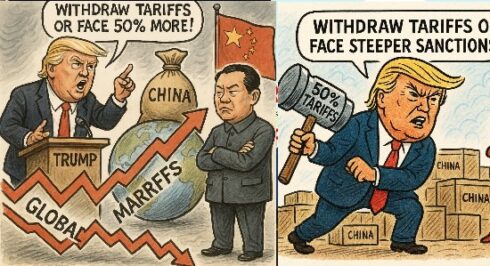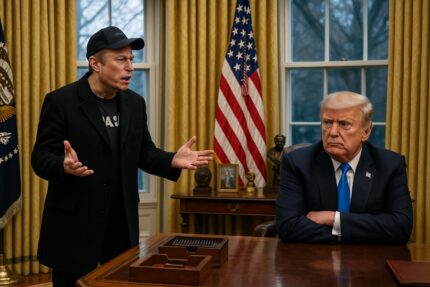USA Vs China Tariff War: On April 7, 2025, President Trump dramatically escalated the U.S. Vs China trade conflict by announcing plans to impose an additional 50% tariff on Chinese imports. Speaking at a press conference from the White House, Trump stated the new tariffs would take effect on April 9 unless Beijing rolled back its newly implemented 34% retaliatory tariffs by April 8.
With this move, the total tariffs on Chinese goods would soar to 104% above pre-Trump levels, marking an unprecedented spike in trade sanctions between the two global economic powers. Trump also revealed a halt to further bilateral trade negotiations, declaring a shift in strategy that would prioritize deals with other nations. “We’ve been more than patient. It’s time to stand firm. If China won’t play fair, we’ll take our business elsewhere,” the President said.
USA Vs China Tariff War| Beijing Responds: ‘Tariff Blackmail’ Will Not Work
The Chinese government wasted no time in issuing a sharp response. The Global Times, a state-backed newspaper often seen as a mouthpiece for Beijing’s policy direction, called Trump’s latest threats a form of “tariff blackmail” and rejected the notion that such pressure would influence Chinese decision-making.
The paper asserted that “China does not bow to coercion,” emphasizing that negotiations must be based on mutual respect and not threats. Officials in Beijing reiterated their commitment to protecting Chinese economic interests and warned that further escalation would be met with “strong, proportionate countermeasures.”
This tit-for-tat dynamic reflects the hardened stances on both sides, dimming hopes for a swift resolution and raising the specter of a long, economically painful standoff.
USA Vs China Tariff War | Economic Alarms: Experts Warn of Recessionary Impact
Economists are sounding the alarm over the potential consequences of the tariff escalation. Carl Weinberg of High Frequency Economics predicts a staggering 4.5% contraction in the U.S. economy in the second quarter of 2025, attributing the downturn directly to the widespread implementation of tariffs and the chilling effect on both consumer demand and business investment.
Michael Feroli, chief U.S. economist at J.P. Morgan, echoed the concerns, forecasting the onset of a recession beginning in June. “The worst economic effects will hit mid-year,” Feroli said, adding that supply chain disruptions and inflationary pressures from the tariffs will ripple across multiple sectors, from manufacturing to retail.
Such dire warnings underscore the potentially severe economic fallout of continuing down this protectionist path, particularly without a clear resolution or international support.
USA Vs China Tariff War | Wall Street Jitters: Stock Market Turmoil Deepens
Financial markets have reacted with heightened volatility as the trade war intensifies. The stock market experienced a sharp selloff following Trump’s announcement, with major indices plunging despite stable earnings estimates. Analysts say this divergence is unusual and signals deeper investor anxiety.
U.S. Vs China Tariff War: In a particularly rare development, both the U.S. stock market and the dollar weakened simultaneously, suggesting a broad-based loss of investor confidence. “This is not your typical correction,” said one analyst at MarketWatch. “It’s driven by policy uncertainty and fears that trade escalation will derail economic growth.”
Market insiders warn that continued unpredictability in Washington could cause further damage, particularly if the April 9 deadline passes without compromise from either side.
USA Vs China Tariff War | Divided Opinions: Supporters Praise Trump’s Tough Stance
While critics warn of economic catastrophe, some prominent voices are backing Trump’s aggressive strategy. Billionaire banker Andy Beal publicly supported the President, framing the tariffs as a necessary corrective to what he described as decades of trade imbalance and fiscal irresponsibility.
According to Beal, the new tariffs are part of a broader strategy to “force a global realignment in trade relations,” and he believes they are essential to achieving fairer terms for the U.S. He emphasized that the American economy cannot sustain its current trade deficit and that decisive action was long overdue.
Beal’s endorsement highlights the ideological divide in public opinion, with some viewing Trump’s moves as bold leadership and others as reckless brinkmanship with global repercussions.
USA Vs China Tariff War Vs China Tariff War | Global Watch: Economic World Holds Its Breath
As the deadline looms, international observers and economic institutions are closely watching the evolving standoff. The ripple effects of an all-out U.S.-China trade war could be global, impacting supply chains, commodity prices, and consumer markets across continents.
U.S. Vs China Tariff War: The International Monetary Fund (IMF) and World Trade Organization (WTO) have yet to officially comment on the developments, but experts expect statements of concern if the proposed tariffs go into effect. Meanwhile, other nations are bracing for the possibility of being drawn into secondary trade conflicts or facing market turbulence from the fallout.
With time running out before Trump’s April 8 deadline, the global economic community waits anxiously to see whether either side will blink—or whether the world is about to enter a new phase of economic uncertainty.
USA Vs China Tariff War Vs China Tariff War | Symbolism vs. Scrutiny: Weighing the Parade’s Impact
While the planned military parade is positioned as a patriotic tribute to the U.S. Army and American strength, critics argue that the event could be more performative than purposeful. Concerns over cost, disruption, and political messaging are likely to dominate public discourse in the months leading up to the event.
U.S. Vs China Tariff War: Defense analysts and civic leaders warn that such displays often carry unintended consequences, including the militarization of civilian spaces and questions about prioritizing spectacle over substance. Whether the parade will rally national unity or deepen partisan divides remains to be seen. For now, Washington prepares for what could be one of the most high-profile and controversial public events of 2025.














